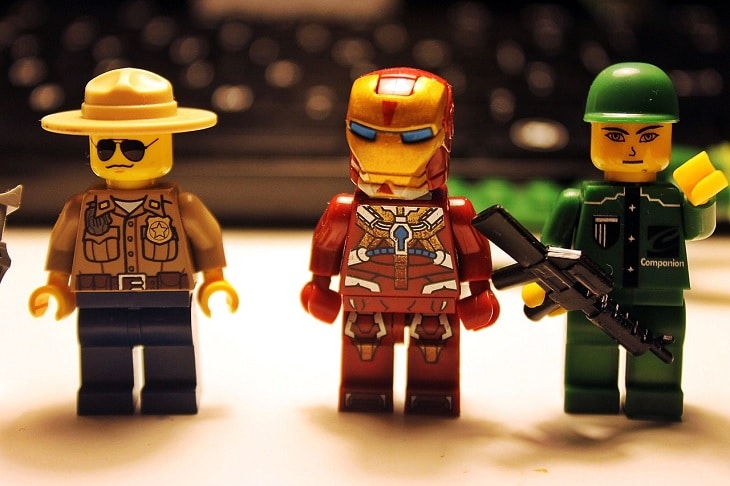Jasmine Birtles
Your money-making expert. Financial journalist, TV and radio personality.

While you may think Lego is only a kids’ toy, it can be much more than that.
A growing number of people buy Lego with the hope that its value increases over time. In other words, these people see buying Lego an investment, similar to buying stocks & shares.
In this article, we’re going to explain how it’s possible to make money from Lego. Keep on reading for all the details, or click on a link to jump straight to a specific section…

If you have a child, you’ll probably know that Lego regularly launches special sets alongside big movies or TV shows. You may have seen the plastic bricks themed with Star Wars, Harry Potter, Lord of the Rings or the Teenage Mutant Ninja Turtles. And that’s in addition to the regular ones, like police stations, castles or haunted houses. There are also limited edition ‘Creator’ and ‘Insect’ sets which are also popular right now.
It’s also worth knowing that the Lego brand now also extends to video games and cartoons – it’s a huge business.
Buying and selling Lego could turn into a good money-making opportunity and it’s all about the life cycle of Lego sets. The company produces and sells sets for a couple of years, after which they retire and won’t be sold in traditional outlets anymore. Those who miss the boat and are desperate for a discontinued set will then need to look for the special editions on eBay or Amazon. So, if you choose to invest in Lego, this is your chance to command high prices for those unique sets that can no longer be bought directly from Lego.

Do your research first. Like with any other investment, to buy and sell Lego for a profit, you’ll need to know your market. Certain genres and sets do better than others. The trick is that nobody really knows if – or when – the brand might discontinue a special edition. This means there’s no way of telling whether a certain set could be sold later at a higher price.
To choose wisely, check out some of the specialist sites dedicated to buying and selling Lego. For example, the online price and investing guide Brickpicker offers plenty of analysis on price trends. This could help you make more informed Lego purchases.
Bear in mind, though, that because Lego is under no obligation to discontinue their sets, there’s never any guarantee that what you buy will be a good investment.
Brick for brick, the sets linked to films or cartoons tend to be more expensive. Make sure you calculate the price per brick of the sets on offer, then wait to buy it when it’s on sale or a special offer. For instance, the resale value of the Star Wars sets has done well in the past, but previous success is not necessarily an indicator that these’ll be good buys for the future.
If you’re interested in seeing which Lego sets have been the top performers over the past year or so, then BrickNerd has an interesting graph on its website. The Lego specialist says the Star Wars Fighter Pilot Helmet, the Monkie Kid ‘Demon Bull King’, and the Fiat 500 sets were its top three performers in 2022.
It’s crucial that you keep your Lego in pristine condition. This means the box must be unopened and stored correctly – away from anyone who might be tempted to open it and play with its contents.
Keeping your box out of direct sunlight is also a must, as a faded set will be less desirable than a set in pristine nick.
Some of the more serious investors in the US lease climate-controlled facilities to keep their Lego in optimum conditions. That’s not to say you should too. Those tend to be the people investing on a bigger scale, for instance, buying 3,000 boxed sets!

There’s no doubt that Lego has enormous potential when it comes to buying it for the purposes of an investment, with double-digit annual returns not unheard of.
If you think that sounds a little ambitious, then its worth digesting a recent study by the Research in International Business and Finance. Its study tracked the prices of 2,000 Lego sets sold on secondary marketplaces between 1987 and 2015 and the typical Lego set in its study rose by 11% annually. This translates to a whopping 2,273% return over this 28-year period.
Compare this to other assets, and you can see just how well Lego performed during this period.
For example, the price of Gold rose just 21% between 1987 and 2015, with an average annual return of 5.17%. Meanwhile, the price of crude oil rose by 8.19% over the same period, which amounts to a 2.88% average annual return.
And its not just alternative assets that Lego has outshone over the recent times. The blue-chip FTSE 100, rose 237% between 1987 and 2015 – a 6.81% average annual return. Again, this is a long, long way off the 11% annual Lego returns reported by the study.
Here’s an illustration…
| Asset | Performance (1987-2015) | Average annual return |
| Lego | +2,273% | +11% |
| Gold | +21% | +5.17% |
| Crude Oil | +8.19% | +2.88% |
| FTSE 100 | +237% | +6.81% |
Now at this point, we should say that just because Lego has performed (very) well in the past doesn’t mean this trend will continue. It’s also worth knowing that the returns in this sample were ‘average’ returns, meaning that not every single set rose by 11%. According to a previous study into Lego returns, profits from buying the plastic bricks can vary from -50% to +600% annually, so don’t assume every set will automatically make you rich.
If you want to sell old Lego sets in bulk then MusicMagpie, Zapper, and Brick Bin will buy the bricks off you.
Alternatively, you could try your luck on other specialist sites, such as BrickNerd, BrickLink, WeBuyGames. And don’t forget the traditional marketplaces – Facebook, and eBay.
Some serious collectors often need a spare piece for their set which might just be hiding in your pile of Lego.
If you’re on the fence about whether to invest in Lego, then you might be swayed after reading about Josh Mangleson, a Lego collector from Brisbane, Australia.
Mangleson says he first started buying Lego as a child, before noticing how the value of his sets had skyrocketed over time.
“In high school before I had my first job I’d try and find ways of making money to buy new LEGO sets. I’d look at buying them online, and I started to see the values on some of my older sets and could hardly believe my eyes. So I started to see my own LEGO collection as a bit of an investment”
Mangleson explained how he sold a total of 250 sets, netting him a $20,000 (£10,600) profit, which he has since used to put down a deposit on a house.
Meanwhile, US-based collector, Lucas Lettrick, says he makes a typical 150-250% return when buying a selling Lego sets. Lettrick says he’s spent a cool $65,000 (£53,000) buying Lego in a recent video interview with the Wall Street Journal.
Yet despite his steep investment, Lettrick recently explained on his YouTube channel, that you don’t need to lots of capital to start out.
“The better strategy I would say, especially if you’re starting out and is the way I started out, is putting smaller amount of money into purchases and then building your way up.
“Start small with a small amount of cash, buy really good purchases that are on really great discounts that you can really maximise what you’re selling them at and how much money your’e getting back out of them and then slowly, as you build up that pot of Lego money, you can start buying bigger sets.”


When I’m about to sell some lego I use oldlego. com to give them the best price, they have a “Value New” field that you can use to price your own set